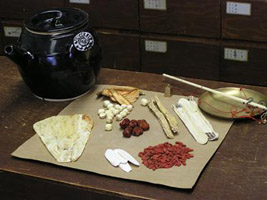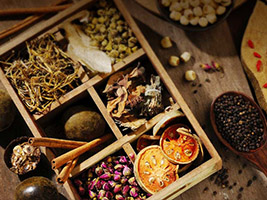HERBS
What are Chinese Herbs?
Chinese Medicine herbology has been an essential component of this culture’s healing practices for centuries, documented as far back as 2697 B.C. It is an ancient form of medicine trusted by Asians and is now spreading throughout the world.
 Chinese herbal medicine is founded on the idea that each herb has varying medicinal and energetic functions, and that the body must stay in balance in order for it to function healthfully. Combinations of Chinese herbs are used in treatment to bring the body into balance and to stimulate self-healing abilities. Traditional Chinese doctors have been experimenting with and documenting the results of these combinations, resulting in a complex pharmacological system of herbal tinctures, pills, teas and powders for the treatment of primary and secondary infections as well as serious and minor diseases. It is a holistic system of medicine that treats the mind, body and spirit through herbal combinations.
Chinese herbal medicine is founded on the idea that each herb has varying medicinal and energetic functions, and that the body must stay in balance in order for it to function healthfully. Combinations of Chinese herbs are used in treatment to bring the body into balance and to stimulate self-healing abilities. Traditional Chinese doctors have been experimenting with and documenting the results of these combinations, resulting in a complex pharmacological system of herbal tinctures, pills, teas and powders for the treatment of primary and secondary infections as well as serious and minor diseases. It is a holistic system of medicine that treats the mind, body and spirit through herbal combinations.
 The qualities of the herbs used are broken down into different categories. First, the herbs are classified by energetic properties as either hot, cold, warm, cool or neutral. When determining what formula will work best, herbs are chosen according to these energetic qualities so that an ailment with a cold nature is treated with herbal combinations with a hot nature. Herbs are also classified by taste, falling into the following categories: sour, pungent, sweet, bitter and salty. The tastes of the herbs further isolate the medicinal properties, since each taste is related to a specific result. For example, bitter herbs are believed to be detoxifying and antibiotic in nature, helping to drain the chi (life energy force) downward while strengthening the heart and small intestine. Sweet herbs, on the other hand, are regarded as nourishing and relaxing and are used to calm and slow chi down while appeasing the spleen and stomach.
The qualities of the herbs used are broken down into different categories. First, the herbs are classified by energetic properties as either hot, cold, warm, cool or neutral. When determining what formula will work best, herbs are chosen according to these energetic qualities so that an ailment with a cold nature is treated with herbal combinations with a hot nature. Herbs are also classified by taste, falling into the following categories: sour, pungent, sweet, bitter and salty. The tastes of the herbs further isolate the medicinal properties, since each taste is related to a specific result. For example, bitter herbs are believed to be detoxifying and antibiotic in nature, helping to drain the chi (life energy force) downward while strengthening the heart and small intestine. Sweet herbs, on the other hand, are regarded as nourishing and relaxing and are used to calm and slow chi down while appeasing the spleen and stomach.
The goal of traditional Chinese medicine is the prevention of illness by maintaining balance in all aspects of life.
In the Chinese philosophy, the focus is on treating the patient as a whole. Illness is regarded as an imbalance in the patient’s body, mind or spirit. This rationale differs from the conventional Western idea of treating symptoms of an existing disease. A skilled practitioner of Chinese herbal medicine will choose appropriate herbal formulas to strengthen, nourish and bring the patient back into balance and harmony.
Chinese herbal medicine has been shown to be effective for a wide variety of acute and chronic conditions, including women’s health issues, anxiety and depression, respiratory problems, hypertension and digestive disorders. Many Chinese herbs are now readily available in the West. People are turning to safe, effective and time-proven alternative treatments that provide a cure without harmful side effects, and often at a much lower cost than pharmaceutical drugs. A few examples of popular herbs are ginseng, ginger, dong quai and ginkgo biloba.
Dr. Nelly Yefet is trained in the use of Chinese herbs and uses them when appropriate for her patients. Chinese herbs, when properly prescribed and used, are remarkably safe. Recent studies have reported that there are literally tens of thousands of deaths every year from western medications that are properly used and properly prescribed. A recent article from 1998 in the Journal of the American Medical Association could find only 12 cases of adverse reactions to herbs.
